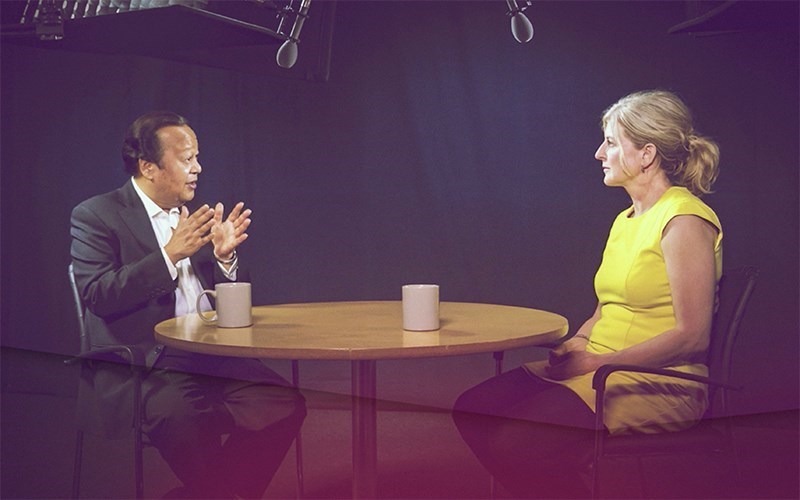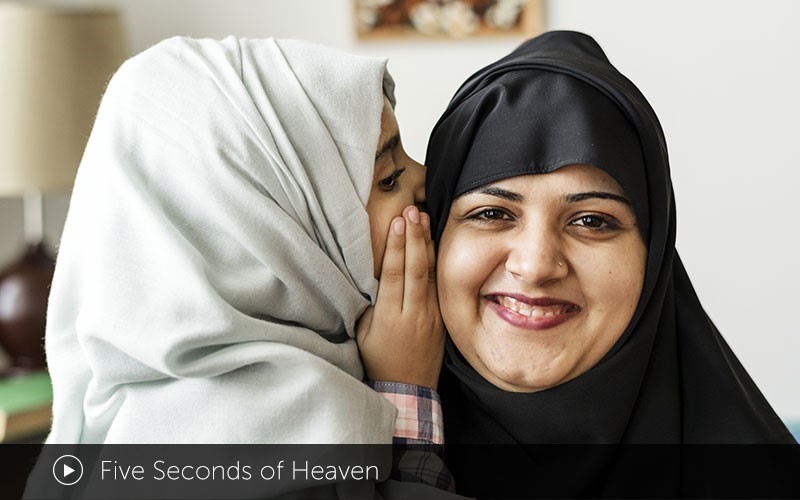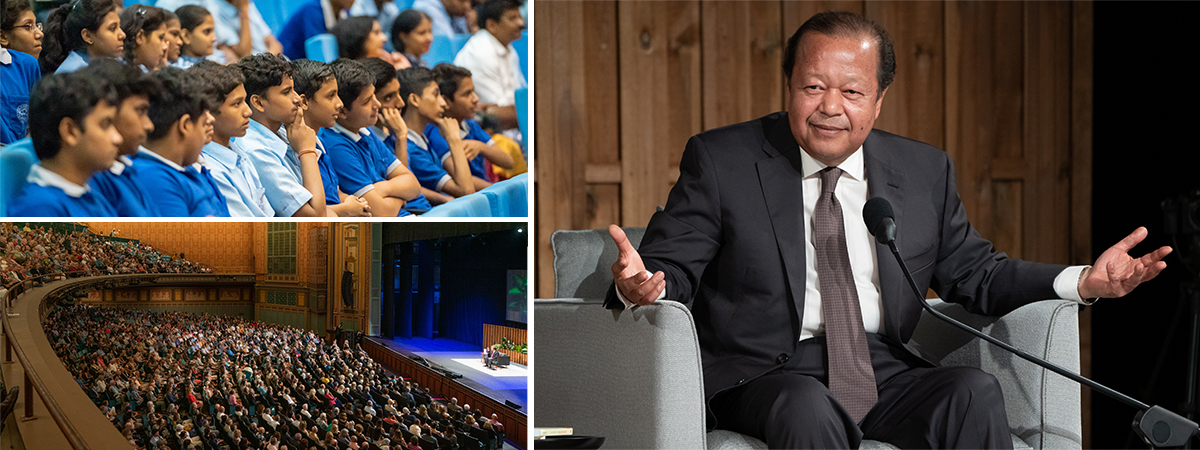Topics
 00:09:21
A Voice for Peace
Video
Duration : 00:09:21
We need to help each other, not get in each others’ way.
00:09:21
A Voice for Peace
Video
Duration : 00:09:21
We need to help each other, not get in each others’ way.
Helle Solvang:
So, Mr. Prem Rawat, I’m doing this language laboratory program in the Danish radio. It’s a weekly magazine where my main focus is to try and discover how language can change people and how we can change ourselves and our surroundings through language.
Prem Rawat:
Well, first of all, thank you very much for having me on this show. And what I have learned is, language, or whatever we use to communicate—we need to communicate; we have a need to communicate. And sometimes people don’t see the need—that they need to communicate.
I mean, in this world today, there are obviously those people who believe in peace and who want peace to be there. When you look at all these wars going on, it is the innocent victims who had nothing to do with making those decisions, who are getting punished. And if they could say something, what would that be?
And that, to me, would establish the need—but they don’t have a voice. And to me it’s like, no, there has to be the voice of need that needs to be the loudest for humanity, the need to be in peace, the need to prosper, the need to be content, the need to be fulfilled.
And just, the need to live a life that they feel is good, that they can be; they can practice their religion; they can practice their faith; they can practice their understanding and have a path that they can go on, that can allow them to better themselves. This is the need, and we need to help each other, not get in each others’ way.
So, taking away that greed and taking away differences and starting to see the similarity, that’s the vision of clarity; that is the voice of clarity, and that is the voice of peace.
Helle Solvang:
Concerning the “voice of peace,” and the “language of peace” that we’ve been weaving around here, you’ve been traveling through so many countries and visiting so many cultures—you’ve got them under your skin. Are there any languages or any cultures in the world that you would say have peace as their core foundation?
Prem Rawat:
I think all of them do. The idea of peace, the feeling of peace, the need for peace, the want for peace has been there with us all along. The better half of a human being is peace. And I think that all cultures do give rise to that—you know, do give credence to that.
“Shalom! Salaam!” Peace! To greet a person by saying, “Peace. May peace be with you.” And this is coming from some of the regions that have been fighting with each other for such a long time! And yet, the first word uttered to greet another human being is “peace.”
I think we want peace, you know? But that voice is so dim now, overshadowed by the noise of greed and arrogance and anger and fear... I mean, so many politicians, they use fear! Fear—“But you don’t do this, then this will happen. And, don’t you, you know, and”—fear!
Give people information; let people make up their mind. Give people information! Don’t manipulate their emotions. Give them information, because I think people are intelligent and will make the intelligent choice.
Helle Solvang:
When I listen to you, I also think sometimes that there’s a heavy load on each individual—the force or the need to change and transform into a better environmentalist, into a more peaceful person, and to be talking in a more peaceful language.
So, how much of the peace and prosperity and of our survival in this world is based on the individual changing and transforming—and how much on systems changing and performing?
Prem Rawat:
That’s a really, really good question. Because, when you were asking that, I was just thinking in my own head, “Is ‘being green’ normal, natural, real? Or is it something that we have to change for?”
So, being green, does that mean...? Is that a deviation? Or, is it coming back to the track where you should have been all along? Being kind, is that a deviation, or is that where you should have been all along?
So, when you start to look at, “That yes, this takes effort”—but it’s only because we have already deviated. And this exercise is not about deviating further, but it’s coming back to where you should be, being human. That’s being human.
And I think that having generosity, having clarity, having kindness, having good choices is normal. And where we are, where it’s anger, it’s fear, it’s, “Destroy nature, capture nature, arrest nature, tame nature,” I think that’s deviated. Because you can work with nature—and she will work with you. Or you can be saying, “I want to tame you”—and she will tame you.
That change that really needs to happen is about understanding who we are—not looking at our differences, but our similarities. And, that in fact, if we all came together—not everyone has to come together—enough of us have to come together—it is, you know, the mass.
Enough of the mass comes together where the greedy become a true minority. And those people who truly understand generosity, acceptance of a human being, acceptance of what we have on this earth—that’s generosity. And I think something amazing is going to happen, amazing is going to happen.
But those who need that voice don’t have it! Because they are like, “No, don’t say anything.” And I think everybody needs to come together and say, “No, say it. Say it.” Say you are alive; say you are here; say you want heaven here—and I think amazing things will happen.
Helle Solvang:
Thank you.
Prem Rawat:
It’s been a pleasure.
 00:03:05
A New World
Video
Duration : 00:03:05
What is your role in making this a brighter world? Enjoy this 3-minute excerpt b...
00:03:05
A New World
Video
Duration : 00:03:05
What is your role in making this a brighter world? Enjoy this 3-minute excerpt b...
(Prem Rawat) This is the time to think about a new world. A world in which we care for each other. A world in which the heart means something. A world where we mean something. A world where kindness has a value. Not “money, money, money” but kindness has a value.
Because if we are incapable of creating a world like that, most of us won’t survive this. It’s going to be required that there is kindness, that there is understanding amongst us for a world, for a better world, for a brighter world in which we all move together going forward. It’s not too late. And such a world is possible.
This is not a question of “That’s impractical.” It’s now an issue of “If that doesn’t happen, it’s going to be a real problem.”
It’s a lot of poor people, a lot of poor people, countries like India, countries like Africa, in the African continent. So many countries. So many people. So many people.
And you, as a human being, are part of it. You’re a part of it. Your heart, your want, your fulfillment, your understanding – you’re a part of it.
 00:06:06
Life Transformed
Video
Duration : 00:06:06
“People’s lives being transformed is not trivial, by any stretch of the imaginat...
00:06:06
Life Transformed
Video
Duration : 00:06:06
“People’s lives being transformed is not trivial, by any stretch of the imaginat...
Prem Rawat:
Let me ask you a question. Have you really been looking for perfection in an imperfect world? Have you? You’re not going to succeed – sorry! You’ve wasted your time. You’re not going to find it. Not outside. The only place you’re going to find it is within you.
Make sure that your objective is very clear to you every single day! And your objective is what? To be in peace. To have a good time! With the little time that you’ve got left, have a good time!
I mean, just have a great time. This will really upset your enemies–seeing you happy. Oh, that would drive them crazy. Because they work so hard to make sure that
you don’t have a good time – and there you are.
And this is what that one couplet says, “That when you came in to this world, you cried and the world laughed. Do something so the world cries and you laugh.”
Do you have a choice? Do you have a choice?! [Audience: No.] Oh, of course you have a choice; you can absolutely make yourself miserable. Absolutely.
And I hope that you, if you are one of those nitpickers, like, “Ah, yeah, and ah, this chariot is a little too big. And it’s a little too small. It’s not enough, hasn’t any headroom. And it doesn’t have this, and it doesn’t have a horn, and it doesn’t have a radio, and it doesn’t have a CD player, and it doesn’t have a DVD player, and it doesn’t have a hard drive,” that you abandon that attitude.
Just abandon it for good. Open your eyes and see how things really are, because they are just incredible. Just incredible. People’s lives being transformed is not trivial. It’s not trivial by any stretch of the imagination.
 00:02:38
Five Seconds of Heaven
Video
Duration : 00:02:38
The day you want to make five seconds of heaven for yourself...
00:02:38
Five Seconds of Heaven
Video
Duration : 00:02:38
The day you want to make five seconds of heaven for yourself...
Five Seconds of Heaven.
Just five seconds. If you have children at home, try to make five seconds of heaven for them. Just five seconds. Start with five.
You have a husband? Five seconds of heaven.
You have a wife? Five seconds of heaven.
What would make five seconds of heaven for a husband?
This is what’s amazing. Oh, it’s not a big breakfast. Listen. Five seconds.
What would make five seconds of heaven for your wife?
What about your children? Surely, give them toys. Right? No. Listen.
And the day you want to make five seconds of heaven for yourself, listen to your heart and you will have that five seconds of heaven.
To be fulfilled. To be in real joy, to have savored, to have known the divine because it was so close to you. To you.
- Prem Rawat
 00:06:06
Clear Objectives
Video
Duration : 00:06:06
“Have you been looking for perfection in an imperfect world? … You’re not going ...
00:06:06
Clear Objectives
Video
Duration : 00:06:06
“Have you been looking for perfection in an imperfect world? … You’re not going ...
Prem Rawat:
Let me ask you a question. Have you really been looking for perfection in an imperfect world? Have you? You’re not going to succeed; sorry! You’ve wasted your time. You’re not going to find it. Not outside. The only place you’re going to find it is within you.
Didn’t I tell you that a long time ago? [Audience: Yeah.] So then, why were you looking for perfection in an imperfect world?
What is this? What is this? We stand at the cusp, at the threshold, of such a possibility to truly change people’s lives. And not just change people’s lives who have a comfy living room. But to change people’s life who are in the midst of that hell.
When I go to South Africa – which I really enjoy going to. Because I know I am helping those people who truly are in that burning hell.
There’s one lady in South Africa lives almost homeless. Very bad living conditions. Living in the Soweto ghettoes, and the ghettoes there are horrible. But a heart so pure. And she wants to help others. She wants to take the Peace Education Program to others.
Not complaining about herself. Not complaining about her situation, not complaining about her living conditions. But a heart of gold.
And this? And you know, ah! I know a lot of people, a lot of you don’t do this but some of you do! Nitpick, nitpick, nitpick, nitpick, nitpick, nitpick, nitpick. Why?! You don’t have to.
You know, one time I read this story; I was in India. And somebody went into the temple and took off Krishna’s clothes on the statue, and put jeans on him. Now, of course, I love this story. From everything that I have seen about Krishna, he was cool. So, obviously, he would have worn jeans if he was now.
And people were so upset – and that was, to me, so entertaining. Do you really go and worship Krishna in your temples? Or do you really go and worship his clothes? If you don’t worship his clothes, then what difference does it make what he’s wearing – or if he’s wearing nothing?
What do you worship? Why did you come to Knowledge? So you can become nitpick experts? Well, I guess Knowledge has helped you with that too. Because some of you are experts at it.
And so, yeah. My recommendation? Don’t try to make bread out of the little flour that’s on your clothes. Just brush it off. Move on! Make sure that your objective is very clear to you every single day! And your objective is what? To be in peace.
 00:02:08
Enjoy This Existence
Video
Duration : 00:02:08
Find the source of joy in you—and hopefully it will infect you!
00:02:08
Enjoy This Existence
Video
Duration : 00:02:08
Find the source of joy in you—and hopefully it will infect you!
More than enough food is produced to feed the whole world. Do you know that? Do you know that? The earth actually produces more than enough food to feed the whole world, every single person, comfortably! So why are people hungry? Greed. Greed. “Throw away food. Throw!” People throw away food.
Do you know what is also one of the largest contributors of methane gas to the atmosphere? Do you know? Food—that’s how much food is thrown away; it actually affects the atmosphere. They bury it, and it rots, and it produces methane, and it goes into the atmosphere.
There are solutions; there are solutions. But the solution begins with you first. When you are happy, then the happiness is contagious. That’s why you like being around people who are happy—because happiness is contagious! You don’t like being around people who are mad, angry, always crying, because it’s contagious too. Sadness is contagious. Joy is contagious.
Find the source of joy in you, and hopefully it will infect you. Infect you! And, enjoy this life. Enjoy this existence. Enjoy this being.
– Prem Rawat





